General Discussion
Related: Editorials & Other Articles, Issue Forums, Alliance Forums, Region ForumsGallup: US standard of living up, food insecurity down
Last edited Fri Jun 12, 2015, 12:00 AM - Edit history (1)
Standard of living ("Are you satisfied or dissatisfied with your standard of living?"![]() :
:
http://www.gallup.com/poll/183536/standard-living-index-ties-high.aspx
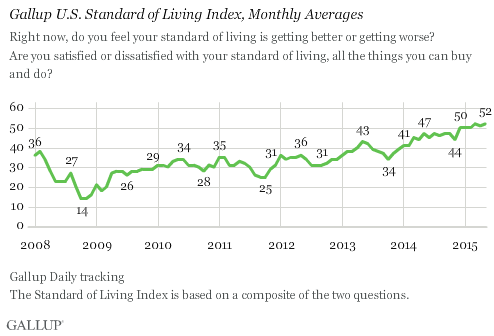
From a long-term view, Americans' opinions of their standard of living have improved since the index reached a low of +14 in October and November 2008 in the midst of the global economic crisis. After gradual increases in the index in the following years, Americans' evaluations of their standard of living returned to early recession levels by 2013. Since then, aside from a gradual decline during the federal government shutdown in 2013, Americans have grown steadily more positive about their standard of living.
Gallup's Standard of Living Index is a composite of Americans' responses to two questions: one asking whether they are satisfied with their standard of living, and the other asking whether their standard of living is getting better or worse. The index has a theoretical maximum of 100 (if all respondents say they are satisfied with their standard of living and say it is getting better) and a theoretical minimum of -100 (if all respondents are dissatisfied with their standard of living and say it is getting worse).
In May, 81% of Americans said they were satisfied with their current standard of living, similar to the ratings Gallup has measured for more than a year. However, the latest reading ties the high point in satisfaction, previously reached in December 2014. Americans have been largely satisfied with their standard of living even at the depths of the recession, with the low point at 69% in 2008.
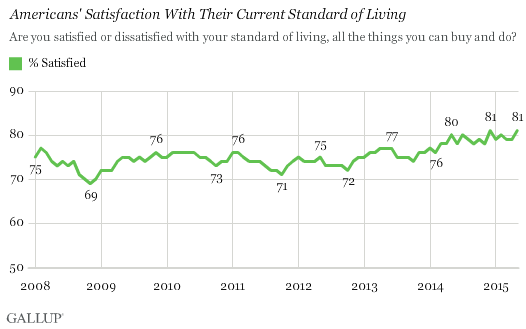
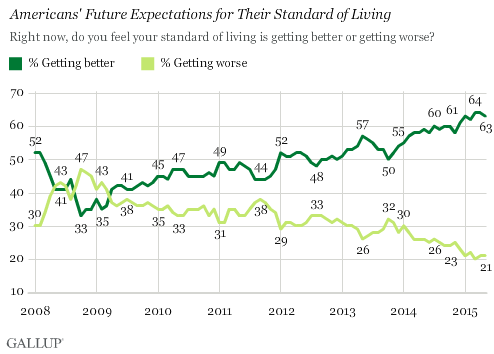
Food insecurity ("In the past twelve months have you not had enough money to buy the food your family needed?"
http://www.gallup.com/poll/183512/percentage-struggling-afford-food-year-low.aspx
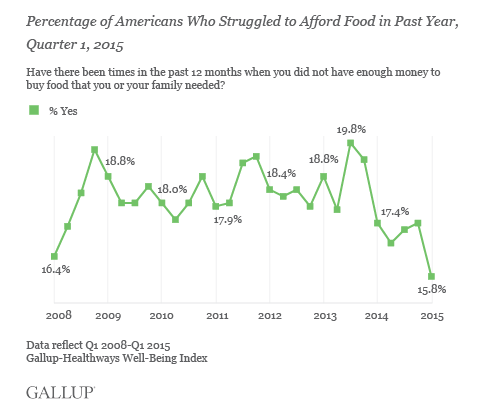
The previous low was in the first quarter of 2008, when 16.4% of Americans reported lacking enough money to buy food for themselves or their families. The percentage peaked in the third quarter of 2013, when nearly one in five Americans said they struggled to afford food.
The decrease in the percentage of Americans agreeing that they have struggled to afford food comes as their financial optimism and perceptions of job creation in their workplaces are at record highs, and as unemployment, as measured by Gallup and the Bureau of Labor Statistics, generally has been declining. Fewer Americans struggling to afford food is a positive sign that the economic recovery could be benefitting some of the poorest Americans.
Across most key demographic groups, the percentage who reported struggling to afford food in the first quarter of 2015 is at least marginally lower than the same period last year, when 17.4% of Americans reported this. Blacks, Asians, younger Americans and lower-income Americans saw the most improvement in their ability to afford food.
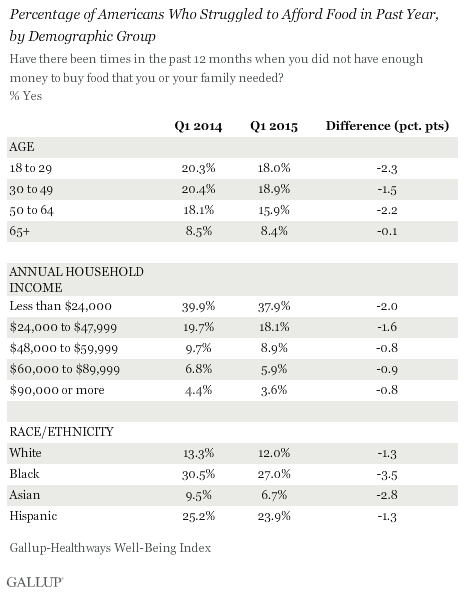
I am kind of curious who the 4% of people makeing $90K or more who couldn't afford food are...
Also, note the huge drop-off in food insecurity in the over-65 crowd: yet another example of Social Security being the most effective poverty-reduction program in the country's history.
PSPS
(13,647 posts)This is only reporting how people "feel." Outside the top 1%, the only thing driving anyone's perception that their "standard of living" is "up" is the increased ease to assume more debt.
Recursion
(56,582 posts)And it's been flat for about a year. Credit card debt is down 2.3% from the start of the year.
http://www.usnews.com/news/business/articles/2015/05/12/us-household-debt-levels-held-back-by-cautious-consumers
https://www.nerdwallet.com/blog/credit-card-data/average-credit-card-debt-household/
I'm not sure what you're getting at with the "feel" issue; Census uses an hedonic measurement for standard of living too.
frazzled
(18,402 posts)while frankly less about reality than how people "feel" about their situation, are still interesting for the fact that the perception of standard of living reached its nadir at the end of the Bush administration and has risen steadily, and dramatically, throughout the Obama years.
As for the drop-off in food insecurity in the over 65 crowd, I think that it perhaps has less to do with Medicare altogether than with some other factors that "seniors" experience: your kids are grown up and no longer eating you out of house and home; and you tend to eat less as you age, and eat out less. Retirees (which we are not yet) have more time to cook at home rather than eat out or do takeout. Or at least that is how I (having recently crossed over into that age group) have experienced things. If I bake a cake, it lasts more than a week for the two of us; when the kids were around (and when we had bigger appetites), it would be gone in two days!